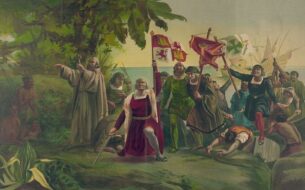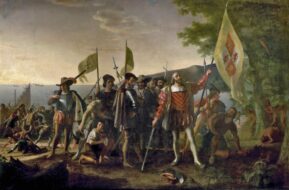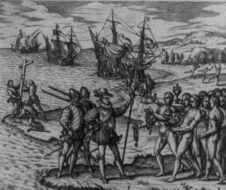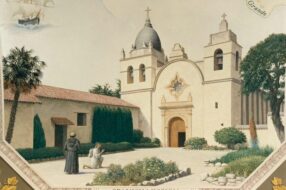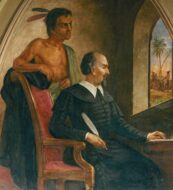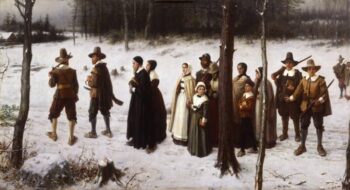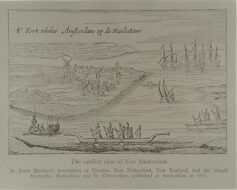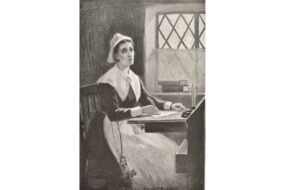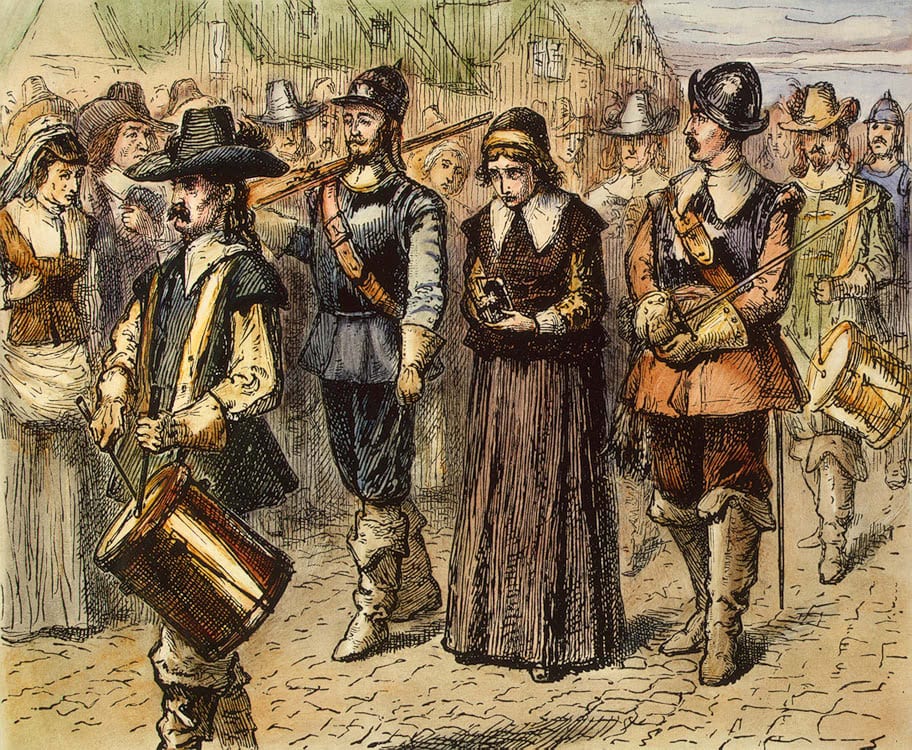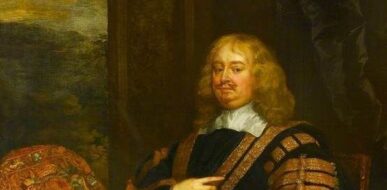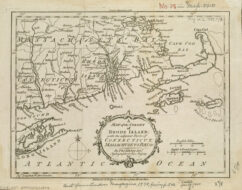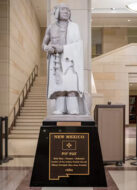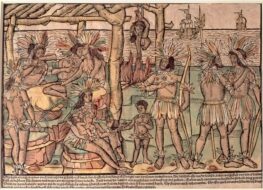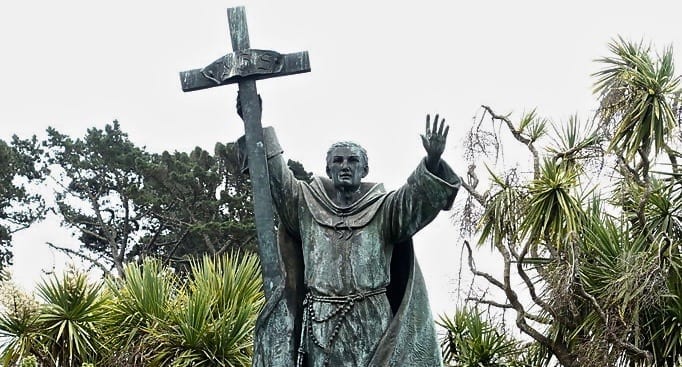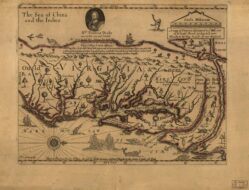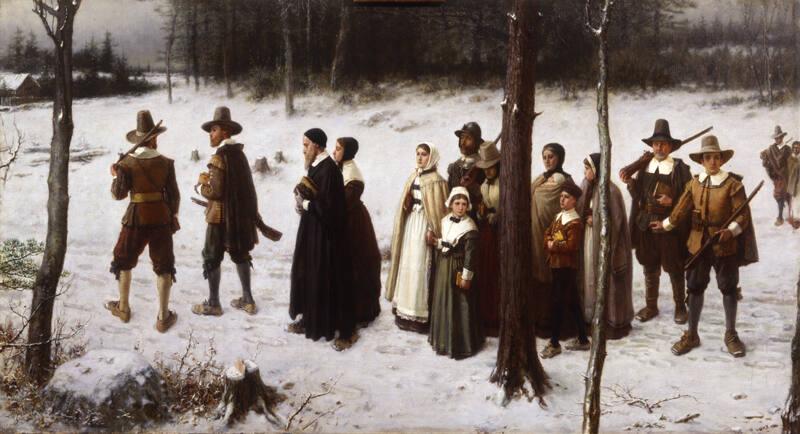
Introduction
Many (although not all) of the early colonists in New England were religious dissenters—persons who had separated from established churches in Great Britain—for whom the New World represented a haven from royal persecution. Particularly in the colonies of Plymouth and Massachusetts, shared religious commitments and the experience of persecution led community leaders to frame their colonies as quasi-utopian places for the faithful to prosper. Given the opportunity to create societies according to their own understandings, they did not hesitate to engage in radical social experiments meant to prove that “godliness” was not only a spiritual virtue but had practical implications for everyday life as well. From the beginning, ministers like Robert Cushman (Document 1) and civil magistrates like William Bradford and John Winthrop (Documents 2 and 3) urged their citizens to recognize that they were drawn together for a purpose far beyond their own liberty, or even security, and to place the welfare of the community as a whole above their own.
Cushman and Winthrop, for example, offered advice to the colonists about how to best prepare themselves mentally and spiritually for the arduous task of a godly commonwealth. Both men urged their audiences to embrace the Christian ideal of “brotherly affection.” In response to the extraordinary demands of colonization, they urged their listeners to willingly be generous and abjure “self-love.” This was taken quite literally at Plymouth, where the London-based investors funding the colony required the colonists to agree that everything would be held in common for the first seven years, and then at the end of that term, all property/profits divided equally between colonists and investors. Although this experiment with communalism failed rather spectacularly and was abandoned after only three years (Document 2), the ethic of neighborliness continued to be an important touchstone in both colonies throughout the seventeenth century.
New colonists (Document 4) continued to arrive regularly throughout the 1630s and 1640s, and as the population increased, the colonists struggled to balance their desire to remain true to their founders’ idealized notion of community with the realities of life and commerce. In Massachusetts Bay, for example, merchants such as Robert Keayne were expected to moderate their desire for profit with a due consideration of the extreme needs and limited means of their customers. Keayne, who was both a shrewd businessman and a devout member of his church, apparently struggled his whole life to meet this standard; at various times, he was admonished by both his congregation and the civil government for unjust business practices (Document 5). This accusation apparently stung so deeply, Keayne used his last will and testament to present an extensive Apologia for his actions (Document 6).
Documents in this chapter are available separately by following the hyperlinks below:
- Robert Cushman, The Sin and Danger of Self-Love, 1621
- William Bradford, Of Property, 1623
- John Winthrop, “A Model of Christian Charity”, 1630
- Passengers Bound for New England, March 20, 1635
- Admonishment and Reconciliation of Robert Keayne with the Church, 1639–1640
- Robert Keayne, Apologia, August 1, 1653
Robert Cushman, The Sin and Danger of Self-Love, 16211
Let no man seek his own; but every man another's wealth —1 Cor. x. 24
. . .
The meaning then summarily is, as if he had said, the bane of all these mischiefs which arise among you is, that men are too cleaving to themselves and their own matters, and disregard and condemn all others; and therefore I charge you, let this self-seeking be left off, and turn the stream another way, namely, seek the good of your brethren, please them, honor them, reverence them, for otherwise it will never go well among you.
Objection. But does not the Apostle elsewhere say? That he, that cares not for his own, is worse than an infidel.
Answer. True, but by “own” there, he means properly, a man’s kindred, and here by “own” he means properly a man’s self.
Secondly, he there especially taxes such as were negligent in their labors and callings, and so made themselves unable to give relief and entertainment to such poor widows and orphans as were of their own flesh and blood. . . .
Doctrine 1. All men are too apt and ready to seek themselves too much, and to prefer their own matters and causes beyond the due and lawful measure, even to excess and offense against God, yea danger of their own souls. . . .
Objection. It is a point of good natural policy, for a man to care and provide for himself.
Answer. . . . I say he must seek . . . the comfort, profit and benefit of his neighbor, brother, associate, etc. His own good he need not seek, it will offer itself to him every hour; but the good of others must be sought. . . .
As a man may neglect, in some sort the general world, yet those to whom he is bound, either in natural, civil, or religious bands, them he must seek how to do them good. . . . Now for one member in the body to seek himself, and neglect all others, were as if a man should clothe one arm or one leg of his body with gold and purple, and let all the rest of the members go naked.
Now brethren, I pray you, remember yourselves, and know, that you . . . have given your names and promises one to another, and covenanted here to cleave together in the service of God, and the king; what then must you do? May you live as retired hermits? And look after no body? Nay, you must seek still the wealth of one another. . . . [My neighbor] is as good a man as I, and we are bound each to other, so that his wants must be my wants, his sorrows my sorrows, his sickness my sickness, and his welfare my welfare, for I am as he is. And such a sweet sympathy were excellent, comfortable, yea, heavenly, and is the only maker and conservator of churches and commonwealths, and where this is wanting, ruin comes on quickly, as it did here in Corinth.2 . . .
It wonderfully encourages men in their duties, when they see the burden equally borne; but when some withdraw themselves and retire to their own particular ease, pleasure, or profit, what heart can men have to go on in their business? . . . Will not a few idle drones spoil the whole stock of laborious bees; so one idle-belly, one murmurer, one complainer, one self-lover will weaken and dishearten a whole colony. . . .
The present necessity requires it, as it did in the days of the Jews, returning from captivity, and as it was here in Corinth. The country is yet raw, the land untilled, the cities not builded, the cattle not settled; we are compassed about with a helpless and idle people, the natives of this country, which cannot in any comely or comfortable manner help themselves, much less us.
. . . [I]f your difficulties be great, you had need to cleave the faster together, and comfort and cheer up one another, laboring to make each other’s burdens lighter; there is no grief so tedious as a churlish companion, and nothing makes sorrows easy more than cheerful associates. Bear you therefore one another’s burden, and be not a burden one to another; avoid all factions, forwardness, singularity and withdrawings, and cleave fast to the Lord, and one to another continually. . . .
Back to TopWilliam Bradford, Of Property, 16233
All this while no supply was heard of, neither knew they when they might expect any. So they began to think how they might raise as much corn as they could, and obtain a better crop than they had done, that they might not still thus languish in misery. At length, after much debate of things, the Governor (with the advice of the chiefest amongst them) gave way that they should set corn every man for his own particular, and in that regard trust to themselves; in all other things to go on in the general way as before. And so assigned to every family a parcel of land, according to the proportion of their number, for that end, only for present use (but made no division for inheritance) and ranged all boys and youth under some family. This had very good success, for it made all hands very industrious, so as much more corn was planted than otherwise would have been by any means the Governor or any other could use, and saved him a great deal of trouble, and gave far better content. The women now went willingly into the field, and took their little ones with them to set corn; which before would allege weakness and inability; whom to have compelled would have been thought great tyranny and oppression.
The experience that was had in this common course and condition, tried sundry years and that amongst godly and sober men, may well evince the vanity of that conceit of Plato’s and other ancients applauded by some of later times; that the taking away of property and bringing in community into a commonwealth would make them happy and flourishing; as if they were wiser than God. For this community (so far as it was) was found to breed much confusion and discontent and retard much employment that would have been to their benefit and comfort. For the young men, that were most able and fit for labour and service, did repine that they should spend their time and strength to work for other men’s wives and children without any recompense. The strong, or man of parts, had no more in division of victuals and clothes than he that was weak and not able to do a quarter the other could; this was thought injustice. The aged and graver men to be ranked and equalized in labours and victuals, clothes, etc., with the meaner and younger sort, thought it some indignity and disrespect unto them. And for men’s wives to be commanded to do service for other men, as dressing their meat, washing their clothes, etc., they deemed it a kind of slavery, neither could many husbands well brook it. Upon the point all being to have alike, and all to do alike, they thought themselves in the like condition, and one as good as another; and so, if it did not cut off those relations that God hath set amongst men, yet it did at least much diminish and take off the mutual respects that should be preserved amongst them. And would have been worse if they had been men of another condition. Let none object this is men’s corruption, and nothing to the course itself. I answer, seeing all men have this corruption in them, God in His wisdom saw another course fitter for them.
Back to TopJohn Winthrop, “A Model of Christian Charity”, 16304
CHRISTIAN CHARITY
A model hereof.
GOD ALMIGHTY in his most holy and wise providence, hath so disposed of the condition of’ mankind, as in all times some must be rich, some poor, some high and eminent in power and dignity; others mean and in submission.
The Reason hereof.
- Reason. First, to hold conformity with the rest of his works, being delighted to show forth the glory of his wisdom in the variety and difference of the creatures, and the glory of his power in ordering all these differences for the preservation and good of the whole; and the glory of his greatness, that as it is the glory of princes to have many officers, so this great king will have many stewards, counting himself more honored in dispensing his gifts to man by man, than if he did it by his own immediate hands.
- Reason. Secondly, that he might have the more occasion to manifest the work of his Spirit: first upon the wicked in moderating and restraining them: so that the rich and mighty should not eat up the poor, nor the poor and despised rise up against their superiors and shake off their yoke. Secondly, in the regenerate, in exercising his graces in them, as in the great ones, their love, mercy, gentleness, temperance etc., in the poor and inferior sort, their faith, patience, obedience, etc.
- Reason. Thirdly, that every man might have need of others, and from hence they might be all knit more nearly together in the bonds of brotherly affection. From hence it appears plainly that no man is made more honorable than another or more wealthy etc., out of any particular and singular respect to himself, but for the glory of his creator and the common good of the creature, man. Therefore, God still reserves the property of these gifts to himself as Ezek. 16:17—he there calls wealth, his gold and his silver,5 and Prov. 3:9—he claims their service as his due, honor the Lord with thy riches, etc.6 All men being thus (by divine providence) ranked into two sorts, rich and poor; under the first are comprehended all such as are able to live comfortably by their own means duly improved; and all others are poor according to the former distribution.
. . . There is a time when a Christian must sell all and give to the poor, as they did in the Apostles’ times. There is a time also when Christians (though they give not all yet) must give beyond their ability. . . . Likewise, a community of peril calls for extraordinary liberality, and so doth community in some special service for the church. Lastly, when there is no other means whereby our Christian brother may be relieved in his distress, we must help him beyond our ability rather than tempt God in putting him upon help by miraculous or extraordinary means.
This duty of mercy is exercised in three kinds: giving, lending and forgiving.
Quest[ion]. What rule shall a man observe in giving in respect of the measure?
Ans[wer]. If the time and occasion be ordinary, he is to give out of his abundance. Let him lay aside as God hath blessed him.7 If the time and occasion be extraordinary, he must be ruled by them: taking this withal, that then a man cannot likely do too much, especially if he may leave himself and his family under probable means of comfortable subsistence.
Object[ion]. A man must lay up for posterity, the fathers lay up for posterity and children, and he is worse than an infidel that provideth not for his own.8
Ans[wer]. For the first, it is plain that it being spoken by way of comparison, it must be meant of the ordinary and usual course of fathers, and cannot extend to times and occasions extraordinary. For the other place, the Apostle speaks against such as walked inordinately, and it is without question that he is worse than an infidel who through his own sloth and voluptuousness shall neglect to provide for his family. . . .
Quest[ion]. What rule must we observe in lending?
Ans[wer]. Thou must observe whether thy brother hath present or probable or possible means of repaying thee, if there be none of those, thou must give him according to his necessity, rather than lend him as he requires; if he hath present means of repaying thee, thou art to look at him not as an act of mercy, but by way of Commerce, wherein thou art to walk by the rule of justice; but if his means of repaying thee be only probable or possible, then is he an object of thy mercy, thou must lend him, though there be danger of losing it, Deut. 15:7. If any of thy brethren be poor etc., thou shalt lend him sufficient. . . .9
Quest[ion]. What rule must we observe and walk by in cause of community of peril?
Ans[wer]. The same as before, but with more enlargement towards others and less respect towards ourselves and our own right. Hence it was that in the primitive Church they sold all, had all things in common, neither did any man say that which he possessed was his own.10 Likewise in their return out of the captivity, because the work was great for the restoring of the church and the danger of enemies was common to all, Nehemiah directs the Jews to liberality and readiness in remitting their debts to their brethren, and disposing liberally to such as wanted, and stand not upon their own dues which they might have demanded of them.11 Thus did some of our Forefathers in times of persecution in England, and so did many of the faithful of other churches, whereof we keep an honorable remembrance of them; and it is to be observed that both in Scriptures and latter stories of the churches that such as have been most bountiful to the poor saints, especially in those extraordinary times and occasions, God hath left them highly commended to posterity. . . .
. . . The definition which the Scripture gives us of love is this: Love is the bond of perfection. First it is a bond or ligament. Secondly it makes the work perfect. There is no body but consists of parts, and that which knits these parts together, gives the body its perfection, because it makes each part so contiguous to others as thereby they do mutually participate with each other, both in strength and infirmity, in pleasure and pain. To instance in the most perfect of all bodies; Christ and his Church make one body; the several parts of this body considered apart before they were united, were as disproportionate and as much disordering as so many contrary qualities or elements, but when Christ comes, and by his spirit and love knits all these parts to himself and each to other, it is become the most perfect and best proportioned body in the world, Eph. 4:16: Christ, by whom all the body being knit together by every joint for the furniture thereof, according to the effectual power which is in the measure of every perfection of parts, a glorious body without spot or wrinkle;12 the ligaments hereof being Christ, or his love, for Christ is love, 1 John 4:8. So this definition is right. Love is the bond of perfection. . . .
The next consideration is how this love comes to be wrought. Adam in his first estate was a perfect model of mankind in all their generations, and in him this love was perfected in regard of the habit. But Adam rent himself from his Creator, rent all his posterity also one from another; whence it comes that every man is borne with this principle in him: to love and seek himself only, and thus a man continueth till Christ comes and takes possession of the soul and infuseth another principle, love to God and our brother, and this latter having continual supply from Christ, as the head and root by which he is united, gets the predomining in the soul, so by little and little expels the former. 1 John 4:7: love cometh of God and every one that loveth is borne of God,13 so that this love is the fruit of the new birth, and none can have it but the new creature. . . .
From the former Considerations arise these conclusions. First, this love among Christians is a real thing, not imaginary. Secondly, this love is as absolutely necessary to the being of the body of Christ, as the sinews and other ligaments of a natural body are to the being of that body. Thirdly, this love is a divine, spiritual, nature; free, active, strong, courageous, and permanent; undervaluing all things beneath its proper object and of all the graces, this makes us nearer to resemble the virtues of our heavenly father. . . .
It rests now to make some application of this discourse, by the present design, which gave the occasion of writing of it. Herein are four things to be propounded; first the persons, secondly the work, thirdly the end, fourthly the means.
For the persons. We are a company professing ourselves fellow members of Christ, in which respect only though we were absent from each other many miles, and had our employments as far distant, yet we ought to account ourselves knit together by this bond of love, and, live in the exercise of it, if we would have comfort of our being in Christ. . . .
For the work we have in hand. It is by a mutual consent, through a special overvaluing providence and a more than an ordinary approbation of the churches of Christ, to seek out a place of cohabitation and consortship under a due form of Government both civil and ecclesiastical. In such cases as this, the care of the public must over sway all private respects, by which, not only conscience, but mere civil policy, doth bind us. For it is a true rule that particular estates cannot subsist in the ruin of the public.
The end is to improve our lives to do more service to the Lord; the comfort and increase of the body of Christ, whereof we are members; that ourselves and posterity may be the better preserved from the common corruptions of this evil world, to serve the Lord and work out our Salvation under the power and purity of his holy ordinances.
For the means whereby this must be effected: they are twofold, a conformity with the work and end we aim at. These we see are extraordinary, therefore we must not content ourselves with usual ordinary means. Whatsoever we did, or ought to have, done, when we lived in England, the same must we do, and more also, where we go. That which the most in their churches maintain as truth in profession only, we must bring into familiar and constant practice; as in this duty of love, we must love brotherly without dissimulation, we must love one another with a pure heart fervently. We must bear one another’s burdens. We must not look only on our own things, but also on the things of our brethren. Neither must we think that the Lord will bear with such failings at our hands as he dothe from those among whom we have lived. . . .
Thus stands the cause between God and us. We are entered into covenant with Him for this work. We have taken out a commission. The Lord hath given us leave to draw our own articles. We have professed to enterprise these and those accounts, upon these and those ends. We have hereupon besought Him of favor and blessing. Now if the Lord shall please to hear us, and bring us in peace to the place we desire, then hath he ratified this covenant and sealed our Commission, and will expect a strict performance of the articles contained in it; but if we shall neglect the observation of these articles which are the ends we have propounded, and, dissembling with our God, shall fall to embrace this present world and prosecute our carnal intentions, seeking great things for ourselves and our posterity, the Lord will surely break out in wrath against us; be revenged of such a [sinful] people and make us know the price of the breaches of such a covenant.
Now the only way to avoid this shipwreck, and to provide for our posterity, is to follow the counsel of Micah, to do justly, to love mercy, to walk humbly with our God.14 For this end, we must be knit together, in this work, as one man. We must entertain each other in brotherly affection. We must be willing to abridge ourselves of our superfluities, for the supply of other’s necessities. We must uphold a familiar commerce together in all meekness, gentleness, patience and liberality. We must delight in each other; make other’s conditions our own; rejoice together, mourn together, labor and suffer together, always having before our eyes our commission and community in the work, as members of the same body. So shall we keep the unity of the spirit in the bond of peace.15 The Lord will be our God, and delight to dwell among us, as his own people, and will command a blessing upon us in all our ways. So that we shall see much more of his wisdom, power, goodness and truth, than formerly we have been acquainted with. We shall find that the God of Israel is among us, when ten of us shall be able to resist a thousand of our enemies; when he shall make us a praise and glory that men shall say of succeeding plantations, “the Lord make it like that of New England.” For we must consider that we shall be as a city upon a hill. The eyes of all people are upon us. So that if we shall deal falsely with our God in this work we have undertaken, and so cause him to withdraw his present help from us, we shall be made a story and a by-word through the world. We shall open the mouths of enemies to speak evil of the ways of God, and all professors for God’s sake. We shall shame the faces of many of God’s worthy servants, and cause their prayers to be turned into curses upon us till wee be consumed out of the good land whither we are a going.
I shall shut up this discourse with that exhortation of Moses, that faithful servant of the Lord, in his last farewell to Israel, Deut. 30: Beloved there is now set before us life and good, Death and evil, in that we are commanded this day to love the Lord our God, and to love one another, to walk in his ways and to keep his Commandments and his Ordinance and his laws, and the articles of our Covenant with him, that we may live and be multiplied, and that the Lord our God may blesse us in the land whither we go to possess it. But if our hearts shall turn away, so that we will not obey, but shall be seduced, and worship and serve other Gods, our pleasure and profits, and serve them; it is propounded unto us this day, we shall surely perish out of the good land whither we pass over this vast sea to possess it;16
Therefore let us choose life—that we, and our seed may live, by obeying His voice and cleaving to Him, for He is our life and our prosperity.17
Back to TopPassengers Bound for New England, March 20, 163518
Bound for New England | Weymouth, 20th of March 1635.
1 Joseph Hull, of Somerset, a Minister, aged 40 years
2 Agnes Hull, his wife, aged 25 years
3 Joane Hull, his daughter, aged 15 years
4 Joseph Hull, his son, aged 13 years
5 Tristram, his son, aged 11 years
6 Elizabeth Hull, his daughter, aged 7 years
7 Temperance, his daughter, aged 9 years
8 Grissell Hull, his daughter, aged 5 years
9 Dorothy Hull, his daughter, aged 3 years
10 Judith French, his servant, aged 20 years
11 John Wood, his servant, aged 20 years
12 Robert Dabyn, his servant aged, 28 years
13 Musachiell Bernard of Batcombe, clothier in the County of Somerset, 24 years
14 Mary Bernard, his wife, aged 28 years
15 John Bernard, his son, aged 3 years
16 Nathaniel, his son, aged 1 year
17 Rich. Persons, salter & his servant, 30 years
18 Francis Baber, chandler, aged 36 years
19 Jesope, joiner, aged 22 years
20 Walter Jesop, weaver, aged 21 years
21 Timothy Tabor, in Somerset of Batcombe, tailor, aged 35 years
22 Jane Tabor, his wife, aged 35 years
23 Jane Tabor, his daughter, aged 10 years
24 Anne Tabor, his daughter, aged 8 years
25 Sarah Tabor, his daughter, aged 5 years
26 Will[ia]m Fever, his servant, aged 20 years
27 Jno. Whitmarke, aged, 30 years
28 Alce Whitmarke, his wife, aged 35 years
29 Jm. Whitmarke, his son, aged 11 years
30 Jane, his daughter, aged 7 years
31 Oaseph Whitmarke, his son, aged 5 years
32 Rich: Whitemarke, his son, aged 2 years
33 Willm Read, of Batcombe, tailor in Somerset, aged 25 years
34 [no name entered]
35 Susan Read, his wife, aged 29 years
36 Hanna Read, his daughter, aged 3 years
37 Susan Read, his daughter, aged 1 years
38 Rich: Adams, his servant, 29 years
39 Mary, his wife, aged 26 years
40 Mary Cheanne, his daughter, aged 1 years
41 Zachary Bickewell, aged 45 years
42 Aguis Bickewell, his wife, aged 27 years
43 Jno Bickewell, his son, aged 11 years
44 Jno Kitchin, his servant, 23 years
46 George Allyn, his son, aged 21 years
47 Katherin Allyn, his wife, aged 30 years
48 George Allyn, his son, aged 10 years
49 Willm Allyn, his son, aged 8 years
50 Mathew Allyn, his son, aged 6 years
51 Edward Poole, his servant, aged 26 years
52 Henry Kingman, aged 40 years
53 Joane, his wife, being aged 39
54 Edward Kingman, his son, aged 16 years
55 Joane, his daughter, aged 11 years
56 Anne, his daughter, aged 9 years
57 Thomas Kingman, his son, aged 7 years
58 John Kingman, his son, aged 2 years
59 Jn Ford, his servant, aged 30 years
60 William Kinge, aged 40 years
61 Dorothy, his wife, aged 34 years
62 Mary Kinge, his daughter, aged 12 years
63 Katheryn, his daughter, aged 10 years
64 Willm Kinge, his son, aged 8 years
65 Hanna Kinge, his daughter, aged 6 years
66 Thomas Holbrooke of Broadway, aged 34 years
67 Jane Hobrooke, his wife, aged 34 years
68 John Holbrooke, his son, aged 11 years
69 Homas Holbrooke, his son, aged 10 years
70 Anne Holbrooke, his daughter, aged 5 years
71 Elizabeth, his daughter, aged 1 years
72 Thomas Dible, husbandman, aged 22 years
73 Francis Dible, sawyer, aged 24 years
74 Robert Lovell, husbandmen, aged 40 years
75 Elizabeth Lovell, his wife, aged 35 years
76 Zacheus Lovell, his son, 15 years
78 Anne Lovell, his daughter, aged 16 years
79 John Lovell, his son, aged 8 years
Ellyn, his daughter, aged 1 year
80 James, his son, aged 1 year
81 Joseph Chickin, his servant, 16 years
82 Alice Kinham, aged 22 years
83 Angell Hollard, aged 21 years
84 Katheryn, his wife, 22 years
85 George Land, his servant, 22 years
86 Sarah Land, his Kinswoman, 18 years
87 Richard Joanes of Dinder
88 Robt Martyn of Badcombe, husbandman, 44
89 Humfrey Shepheard, husbandman, 32
90 John Upham, husbandman, 35
91 Joane Martyn, 44
92 Elizabeth Upham, 32
93 John Upham, Junior, 7
94 William Grane, 12
95 Sarah Upham, 26
96 Nathaniell Upham, 5
97 Eliazabeth Upham, 3
98 Dorset Richard Wade of Simstuly, cooper, aged 60
99 Elizabeth Wade, his wife, 6[?]
100 Dinah, his daughter, 22
101 Henry Luch, his servant, aged 17
102 Andrew Hallett, his servant, 28
103 John Hobble, husbandman, 13
104 Robt Huste, husbandman, 40
105 John Woodcooke, 2[?]
106 Rich: Porter husbandman, 3[?]
Back to TopTrial, Admonishment and Reconciliation of Robert Keayne, 1639–1640
November 9, 1639: At a general court20 held at Boston, great complaint was made of the oppression used in the country in sale of foreign commodities; and Mr. Robert Keayne, who kept a shop in Boston, was notoriously above others observed and complained of; and, being convented,21 he was charged with many particulars; in some, for taking above six-pence in the shilling profit; and in some above eight-pence; and in some small things, above two for one; and being hereof convict (as appears by the records), he was fined 200£, which came thus to pass: The deputies considered apart23 of his fine, and set it at 200£;22 the magistrates agree to but 100£. So, the court being divided, at length it was agreed, that his fine should be 200£, but he should pay but 100£, and the other should be respited to the further consideration of the next general court.
By this means the magistrates and deputies were brought to an accord, which otherwise had not been likely, and so much trouble might have grown, and the offender escaped censure. For the cry of the country was so great against oppression, and some of the elders24 and magistrates had declared such detestation of the corrupt practice of this man (which was the more observable because he was wealthy and sold dearer than most other tradesman, and for that he was of ill report for the like covetous practice in England, that incensed the deputies very much against him). And sure the course was very evil, especial circumstances considered: 1. He being an ancient professor of the gospel; 2. A man of eminent parts; 3. Wealthy, and having but one child; 4. Having come over for conscience’ sake, and for the advancement of the gospel here; 5. Having been formerly dealt with and admonished, both by private friends and also by some of the magistrates and elders, and having promised reformation; being a member of a church and commonwealth now in their infancy, and under the curious observation of all churches and civil states in the world.
These added much aggravation to his sin in the judgment of all men of understanding. Yet most of the magistrates (though they discerned of the offence clothed with all these circumstances) would have been more moderate in their censure: 1. Because there was no law in force to limit or direct men in point of profit in their trade. 2. Because it is the common practice, in all countries, for men to make use of advantages for raising the prices of their commodities. 3. Because (though he were chiefly aimed at, yet) he was not alone in this fault. 4. Because all men through the country, in sale of cattle, corn, labor, etc. were guilty of the like excess in prices. 5. Because a certain rule could not be found out for an equal rate between buyer and seller, though much labor had been bestowed in it, and diverse laws had been made, which, upon experience, were repealed, as being neither safe nor equal. Lastly, and especially, because the law of God appoints no other punishment but double restitution, and in some cases, as where the offender freely confesseth, and brings his offering, only half added to the principal.
After the court had censured him, the church in Boston called him also in question, where (as before he had done in the court) he did, with tears, acknowledge and bewail his covetous and corrupt heart, yet making some excuse for many of the particulars, which were charged upon him, as partly by pretense of ignorance of the true price of some wares, and chiefly by being misled by some false principles, as, 1. that if a man lost in one commodity, he might help himself in the price of another; 2. that if, through want of skill or other occasion, his commodity cost him more than the price of the market in England, he might then sell it for more than the price of the market in New England, etc. These things gave occasion to Mr. Cotton,25 in his public exercise the next lecture day, to lay open the error of such false principles, and to give some rules of direction in the case:
. . . The rules for trading were these: –
- A man may not sell above the current price, i.e., such a price as is usual in the time and place, and as another (who knows the worth of the commodity) would give for it, if he had occasion to use it. . . .
- When a man loseth in his commodity for want of skill, etc. he must look at it as his own fault or cross and therefore must not lay it upon another.
- When a man loseth by casualty of sea, or etc., it is a loss cast upon himself by providence, and he may not ease himself of it by casting it upon another; for so a man should seem to provide against all providences, etc., that he should never lose; but where there is a scarcity of the commodity, there men may raise their price; for now it is a hand of God upon the commodity, and not the person.
- A man may not ask any more for his commodity than his selling price.
. . .
The cause being debated by the church, some were earnest to have him excommunicated; but the most thought an admonition would be sufficient. . . .
November 26, 1639: Being a day of public fast[ing] for our congregation, our brother Mr. Robert Keayne was admonished by our pastor in the name of the church for selling his wares at excessive rates, to the dishonor of God’s Name, the Offence of the General Court, and the public scandal of the country.
May 7, 1640: Being a day of Fasting etc., whereas our brother Mr. Robert Keayne was on the 26th day of the 9th Month 1639 being likewise a day of public fast admonished for selling wares at excessive rates; upon his penitential acknowledgment thereof this day and promise of further satisfaction to any that have just offence against him, he is now become reconciled to the Church.
Back to TopRobert Keayne, Apologia, August 1, 165326
. . . I look up to His throne of grace and mercy in the blood of Jesus Christ with some hope and confidence. . . . In this faith alone I desire both to live and die and to continue therein to my life’s end.
This faith in the Lord Jesus Christ hath been most plainly and sweetly taught in these churches of New England, in which place, though I met with many and deep sorrows and variety of exercises of spirit and hard measures offered to me, yet with unrepentant thoughts I desire to acknowledge it for a great blessing and undeserved favor of God that he hath brought me hither to enjoy His presence in the beauties of holiness, and to see His walkings in his Holy sanctuary. And though there may be failings in both our civil government and churches. . . yet I do unfeignedly approve of the way of the churches of Jesus Christ and the civil government that God hath here set up amongst us, and rejoice therein. . . .
I am not ignorant that formerly there hath been many clamors and evil reports raised up against me here and elsewhere as if I had got my estate by unjust dealing and wronging of others. That all might take notice that I durst not allow myself in any such known wickedness as hath been falsely reported against me, I did in some of my former wills and also in my last before this, of anno 1649 . . . set apart two hundred pounds out of my own estate, that if any man or woman (not knowing but that I might have died long before this time) young or old, in Old England or New, could justly challenge or make it appear by good proof or reason that I had in anything unjustly wronged or defrauded them, that they might have had full satisfaction allowed them, though I know of no such things that can justly be laid to my charge, nor any pretense of show of it [which], if I were alive to answer for myself, I should [not] easily clear and remove. But having now lived in New England this 17 or 18 years where there is an open passage in church and commonwealth where any that are unjustly wronged may easily right themselves if I should obstinately refuse to do them right, and none such having appeared in so many years, I think it needless to continue any longer what I formerly sequestered out of my estate for such ends. If any should come with such pretenses after I am dead, the falseness of them may the more justly be suspected in that they came not while I was alive. I speak of debts and unjust frauds, not of human infirmities and failings which may be common to myself as to other men. . . .
I desire in this my will to give an account of my actions and endeavor to remove all jealousies as near as I can, these being as it were my last words that will live to speak for me when I am dead and in my grave. And God may be pleased so far to bless something or other that I have had occasion to express in this will, that such which have taken liberty to load me with diverse reproaches and long to lay me under a dark cloud may have cause to see that they have done amiss and now to be sorry for it, though they have not been so before.
The objections are these:
First, if I value my estate to be worth 4000 lb. or thereabouts, how could I get such an estate with good conscience, or without oppression in my calling, seeing it is known to some that I had no portion from my parents or friends to begin the world withal. If none did know of this, I am bound to acknowledge [it], that all may be attributed to the free mercy and kindness of God alone who raiseth up and pulleth down as he pleaseth. . . .
To which I answer, I have now traded for myself about 40 or 50 years and through the favor of God, though I had very little at first to begin with, yet I had good credit and good esteem and respect in the place where I lived so that I did ever drive a great trade not only since I came hither but especially in England.
Now to get 4000 lb. in 40 or 50 years is not 100 lb. a year clear gains, one year with another, which we account to be no great matter. . . . A tradesman or merchant that hath a full trade may get 100 lb. a year above his expenses and a great deal more very honestly without hurting his own conscience or wronging those that he deals with at all.
Since I came into New England . . . I have been no prodigal spender as I have been no niggardly sparer in things needful, as the account of my daily and weekly expenses will testify for me when those books come to be viewed over. . . .
For . . . I have undergone many censures since I came hither according to men’s uncharitable and various apprehensions, some looking at me as an oppressor in trading and getting unconscionably by what I sold and others as covetous and niggardly in housekeeping and not so liberal and bountiful as I should be. How those two contraries can justly be charged upon me and yet have increased my estate no more in so long a time, I yet see not, [unless] it be [charged] by such as care not what they say of other men though never so false, so [long as] they may lay others under reproach and magnify themselves and their ways by disgracing others. . . .
But some may further object [that] if I do value my estate at so much as before mentioned, how could I deal honestly in suffering myself to be valued in rates to the country but after a 1000 lb. estate at most, or sometimes less.
To which I answer, first, that I do not think a man is bound in conscience to make known his whole estate and suffer himself to be valued to the uttermost extent thereof if he can honestly prevent it. It is not so in any nation in the world that I have heard or read of, except in case of great extremity by an enemy in the country. . . .
I know myself and others here pay more to rates and public charges yearly than those that are three times of my estate in England in four or five years. . . . Here we are rated every year, and in some one year I have paid near twenty lb. to country rates. Therefore, though some may judge that men’s estates are undervalued, everyone seeking to ease themselves and lay the burden upon others, yet rates did rise so high upon the pound and came so fast about that men may be truly said in that respect to be rated far above and beyond their estates. . . .
- 1. Robert Cushman, The Sin and Danger of Self-Love . . .1621(Boston: 1846).
- 2. Cushman refers to the Church in Corinth, to which Paul wrote the letter that provides the text of Cushman's sermon.
- 3. William Bradford, Of Plimoth Plantation: From the Original Manuscript (Boston: Wright and Potter, State Printers, 1898), 162-164.
- 4. John Winthrop, "A Model of Christian Charity," Collections of the Massachusetts Historical Society (Boston, 1838), 3rd series 7: 31-48.
- 5. Ezekiel 16:7.
- 6. Proverbs 3:9.
- 7. I Corinthians 16:2.
- 8. I Timothy 5:8.
- 9. Deuteronomy 15:7-8.
- 10. As recounted in Acts 2:44-45.
- 11. As recounted in Nehemiah 5.
- 12. Winthrop here summarizes his reading of Ephesians 4 and 5, in part paraphrasing 4:13-16, which describes the church as a body made of many parts, each member learning to fill a particular role, all striving together in love to become the earthly embodiment of Christ, "the perfect man." He is also remembering 5:27, which likens the church to a body made perfect by Christ's atoning sacrifice.
- 13. I John 4:7, "Beloved let us love one another: for love is of God; and every one that liveth is born of God, and knowers God."
- 14. Micah 6:8
- 15. Ephesians 4:3
- 16. Winthrop quotes Deuteronomy 30:15-18, inserting what he understands to be the contemporary application of "other gods."
- 17. A summary of Deuteronomy 30:19-20.
- 18. New England Historical and Genealogical Register, Volume 25, 1871, pp.13-15.
- 19. Richard D. Pierce, ed., "The Records of the First Church in Boston, 1630-1868," Colonial Society of Massachusetts, Publications 39 (1961), 26, 29. Details of the case can be found in John Winthrop's Journal: A History of New England, Volume 1, edited by James Kendall Hosmer (New York: Scribner, 1908), 315-318.
- 20. The Massachusetts legislature throughout the colonial period was known as the General Court (to distinguish it from the county courts). It consisted of an upper house, whose delegates were known as "magistrates," and a lower house, whose delegates were known as "deputies."
- 21. That is, a member of a particular congregation, and thereby bound to act in accordance with their teachings, as well as accept their oversight and discipline.
- 22. Roughly $50,000 in 2018.
- 23. Separately from the magistrates; the Massachusetts legislature, known as the General Court, often sat as a single body, so this separation was noteworthy.
- 24. Within the church polity of Massachusetts, an elder was an elected leader of a particular congregation, either in a teaching capacity (ministers) or an administrative one (laymen). Elders, whether ministers or laymen, were men respected for their spiritual wisdom and often called upon to offer counsel to the General Court.
- 25. John Cotton (1585-1652), a leading minister in the Massachusetts Bay colony.
- 26. "Will of Robert Keayne," in Report of Record Commissioners of the City of Boston, Containing Miscellaneous Papers (Boston, 1886), pp. 1-54.
Richard Frethorne to His Parents
March 20, 1623
Conversation-based seminars for collegial PD, one-day and multi-day seminars, graduate credit seminars (MA degree), online and in-person.
